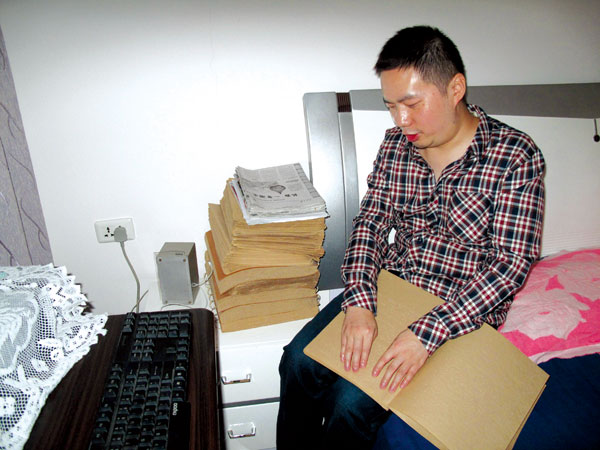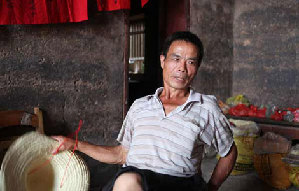Beyond massage
 |
|
Zheng learns from his Braille English textbook, New Concept English. |
With his first seven years spent in the small town, Zheng started his formal education at the Chongqing School for the Blind, the only special school for the visually impaired in the city, offering children education from first grade to junior high school. Due to the three hours required for travel from his hometown to the school, Zheng was enrolled as a boarding student. "The majority of my schoolmates become massage therapists after graduation from junior high school. This occupation seems to be the only way for our blind people to feed ourselves," he says.
Zheng refused such "so-called destiny".
"I do not hate to be a therapist. But as a teen, I wanted to fight against the 'fate to be a therapist', when everybody told you that in China, it is the only way out for the blind," he says.
After graduation, he went to Qingdao to continue his senior high school, aiming for universities.
"It was the only school for the blind offering ordinary senior high school education then," he says. So the 15-year-old boarded in a city about 1,900 km from home.
However, when he completed high school studies and was preparing for college, he found that as a student with a visual disability, massage and acupuncture was the only major available to him.
"I returned to the 'right track' for the blind," says Zheng, who had no other choice but to become a college student at Changchun University in 2001.
After gaining a bachelor's degree in massage and acupuncture, Zheng entered Qianjiang Hospital of Traditional Chinese Medicine, as a physical therapist, which he quit after three years' practice.
He was ready to try something else.
"From a young age, we have been categorized and put into special schools. I hope I can mingle with 'mainstream' society, and I believe that I have the ability," he adds.
"In some developed countries, people with disabilities are treated like anyone else," says Zheng. For example, when he took the IELTS, he had received assistance such as special paper and typing software from the British consulate in Chongqing.
Chen Bing, acting area director in Southwest China for the cultural and education section of the British consulate-general, told China Daily that IELTS design is based on the UK's education system that advocates inclusive education. It is a "test shaped by your needs", he says, adding that IELTS has provided a special exam for 140 special-needs candidates since 1989 in China including 26 with visual disability.
While special schools for students with special needs are discouraged, they are the only way for such students in China to get an education.
Students are isolated in a small group instead of interacting with ordinary peers. They may live in a small group at school and then live in a small world forever, says Lu Jun, a Beijing lawyer who is also a visiting researcher at the Chinese University of Hong Kong, specializing in rights for disabled people.
A report by the China Disabled Persons' Federation released in September shows 28 percent of school-aged children with disabilities in China still cannot be enrolled at school, compared with their able-bodied peers, who have a 99.85 percent enrollment rate.
"In the higher education system, students with special needs lack access to institutes. Schools only give exam catering to 'ordinary' students without assisting students with special needs. How can disabled students get in?"
Zheng, as a lucky one, is busy with his new life in Essex. He says he doesn't have a long-term goal for life - instead he copes with it and enjoys it by setting one modest goal after another. The most pressing one is to find the way between his apartment and school. "They are about 1 mile apart," he says.
| Keepers of the flame | Boatman teacher |
For more China Face, here


















